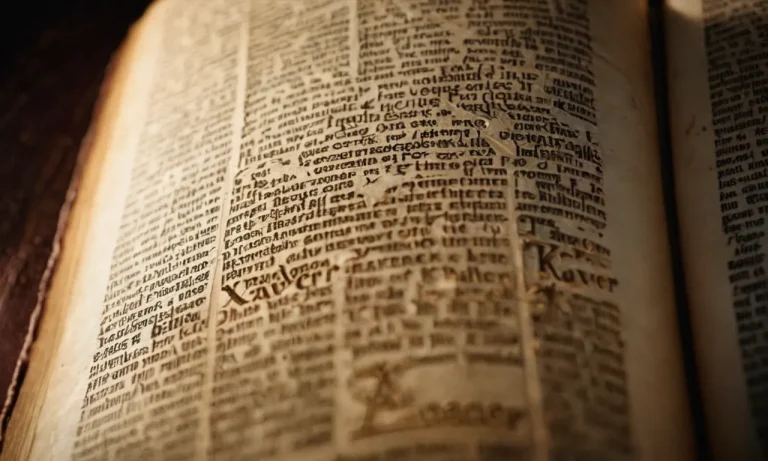3 Reasons Why God Called Moses
The story of Moses is one of the most pivotal in the Old Testament. Moses was chosen by God to lead the Israelites out of slavery in Egypt and into the Promised Land. But why did God specifically call upon Moses for this monumental task?
If you’re short on time, here’s a quick answer to your question: God called Moses because of his compassion for his people, his close relationship with God, and his leadership capabilities.
In this article, we will explore the 3 main reasons why God called upon Moses to lead the Israelites out of Egypt. Understanding God’s motivation for selecting Moses will help us better comprehend this critical Biblical narrative and what we can learn from it today.
Moses Had Compassion for His People
Moses Stood Up to the Egyptian Overseer
When Moses saw an Egyptian overseer beating a Hebrew slave, he was moved with compassion and anger. Despite being a prince of Egypt, Moses stood up for his oppressed people and killed the cruel overseer (Exodus 2:11-12).
This shows that Moses cared deeply about the welfare of the Hebrew slaves and was willing to sacrifice his privileged position in Egypt to protect them.
Moses Tried to Make Peace Between the Hebrews
After fleeing Egypt, Moses came upon two Hebrew men fighting when he arrived in Midian. Rather than ignore the conflict, Moses tried to make peace between them, asking “Why are you hitting your companion?” (Exodus 2:13).
This demonstrates Moses’ compassionate spirit and drive to reconcile relationships, even amongst his own people. Though he struggled with anger issues himself at times, Moses strove to gently calm disputes he encountered.
Moses was Anguished Over the Suffering of His People
When God first called Moses from the burning bush, Moses questioned if he was the right person for the task. But ultimately he agreed to confront Pharaoh after hearing about the intense suffering and affliction of the Hebrew slaves (Exodus 3:7-10).
Moses was clearly pained to see the cruelty his people faced under Egyptian oppression. His anguish spurred him to action despite hesitations and doubts about his leadership abilities early on. His compassion compelled him to help liberate the Hebrews from bondage though he feared Pharaoh’s reaction.
In another instance demonstrating his care for the Israelites during their desert wanderings, Moses earnestly pleaded for God’s forgiveness and mercy when God threatened to destroy them for worshipping the golden calf idol (Exodus 32:11-14).
Moses begged God to turn from fierce anger and spare His people, even daring to remind God of His covenant promises. This intercessory prayer flows from a heart broken over seeing God’s wrath poured out. Moses deeply loved his people and boldly stepped in to mediate between God and sinners.
Moses Had a Close Relationship with God
God Spoke to Moses Through the Burning Bush
God first revealed Himself to Moses through the burning bush on Mount Horeb (Exodus 3:1-4). This miraculous event got Moses’ attention and opened up direct communication between God and Moses. God told Moses that He had seen the affliction of His people in Egypt and was sending Moses to Pharaoh to bring the Israelites out of bondage (Exodus 3:7-10).
God assured Moses that He would be with him (Exodus 3:12). This initial encounter established Moses as someone who had a close and trusted relationship with God.
Moses Conversed Directly with God on Mt. Sinai
Later, God spoke to Moses on Mount Sinai and gave him the Ten Commandments (Exodus 19-20). God said He had personally brought the Israelites out of Egypt and they would be His treasured possession and a kingdom of priests if they kept His covenant.
This showed the special standing Moses had with God, as the mediator who could ascend Sinai and directly commune with God to receive His law for the people.
In Exodus 33, Moses again went up Mount Sinai and spoke directly with God. He pleaded for God’s presence to go with Israel towards the promised land. God agreed to reveal His glory to Moses and proclaimed His compassion, grace and sovereignty (Exodus 33:12-23).
This face-to-face interaction demonstrates Moses’ intimate access to God.
Moses Pleaded with God to Spare the Israelites After the Golden Calf Incident
Moses’ close relationship with God was shown when he interceded for Israel after their sin with the golden calf. God was ready to destroy the people, but Moses appealed to God’s reputation and prior promises (Exodus 32:11-14).
Remarkably, God relented from the disaster in response to Moses’ prayer (Exodus 32:14). Later, Moses went back up Sinai and prayed for God to forgive Israel’s sin and continue traveling with them (Exodus 34:8-9). God affirmed His covenant with Israel in response.
This reveals how God regarded Moses and listened to his earnest petitions.
Clearly, Moses shared an intimate, two-way relationship with God. God spoke to him as a friend through the burning bush, on Mount Sinai, and allowed Moses to reason with Him. Their conversations and Moses’ special access to God’s presence set him apart as someone truly close to the Lord.
Moses was a Capable Leader
Moses Effectively Organized the Israelites for the Exodus
When God called Moses to lead the Israelites out of Egypt, Moses demonstrated strong organizational skills. He appointed leaders over groups of thousands, hundreds, fifties, and tens to establish an effective chain of command (Exodus 18:25).
This organizational structure allowed Moses to delegate tasks and unify a crowd of over 600,000 people (Exodus 12:37). Through his foresight, Moses set the foundation for an orderly exodus from Egypt.
Moses Delegated Authority to Trusted Helpers
A key aspect of Moses’ leadership was his willingness to delegate authority. For example, he appointed his brother Aaron to be his spokesman before Pharaoh (Exodus 4:16). Moses also appointed Joshua as a military commander during the battle against the Amalekites (Exodus 17:9).
By delegating tasks to capable helpers like Aaron and Joshua, Moses shared the administrative load, allowing him to focus on big-picture leadership. This delegation of authority was crucial in handling the challenges of the wilderness journey.
Moses United the People Through Times of Hardship and Doubt
Moses faced great adversity in leading the Israelites, including food shortages, thirst, and internal rebellions. However, he persevered in keeping the people united as one nation dedicated to Yahweh. For instance, during a rebellion at Meribah, Moses appealed to God to provide water, unifying the people around a miraculous provision (Exodus 17:1-7).
Later, when the Israelites fell into idolatry with the golden calf, Moses displayed righteous anger and called them back to covenant faithfulness. Through difficult times, Moses tenaciously led. His commitment to God and to the people ensured they completed the journey as one nation under Yahweh.
Conclusion
In conclusion, God chose Moses to lead the Israelites out of Egypt because of his compassion, close relationship with the Divine, and leadership qualities. Though Moses was at first reluctant to take on this monumental task, he proved capable of uniting the Israelite tribes and guiding them towards the Promised Land.
The story of Moses contains many lessons that are still relevant today about leadership, faith, and liberation from oppression. By examining the reasons why God called upon Moses, we gain insight into how God selects individuals for important purposes in Biblical narratives and in our lives today.








